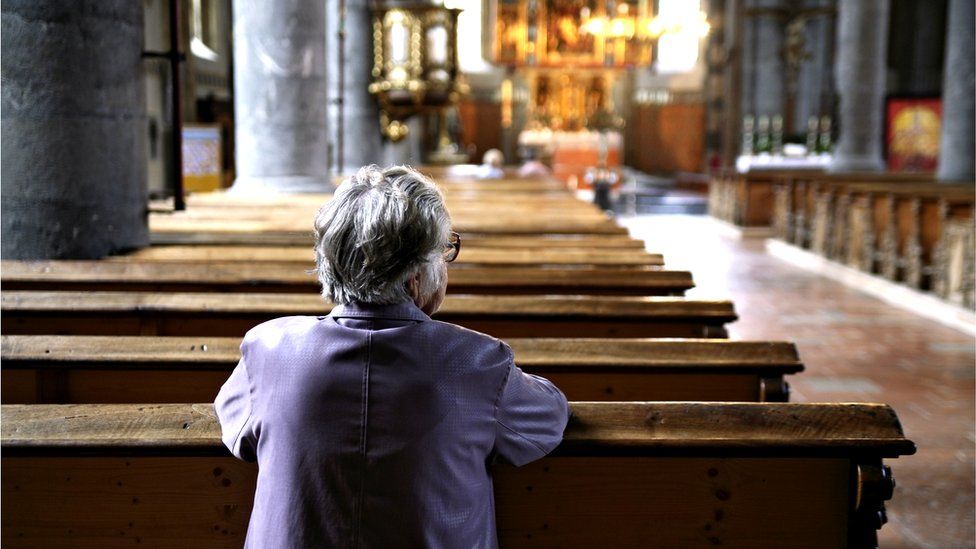Covid-19: Religious groups in England criticise lockdown worship ban
- Published

Religious groups in England have strongly criticised the new lockdown rule banning communal worship.
England's four-week lockdown will see most religious services banned. Funerals will still be allowed, with a maximum of 30 attending.
The Catholic Church described the ban as a cause of "anguish" and demanded the government gives its reasons for stopping services.
The Muslim Council of Britain called for an urgent review of restrictions.
The Catholic Church Bishops' Conference said communal worship had helped many during the pandemic.
Cardinal Vincent Nichols and Archbishop Malcolm McMahon, president and vice president of the association, also stressed that churches had acted responsibly and been Covid-safe.
"It is... a source of deep anguish now that the government is requiring, once again, the cessation of public communal worship," the bishops said in a statement.
"Whilst we understand the many difficult decisions facing the government, we have not yet seen any evidence whatsoever that would make the banning of communal worship, with all its human costs, a productive part of combating the virus.
"We ask the government to produce this evidence that justifies the cessation of acts of public worship."
Prime Minister Boris Johnson announced on Saturday that England would be under a new lockdown from 5 November until 2 December.
Other than for funerals, the only other reasons places of worship can stay open is to broadcast acts of worship, individual prayer, formal childcare, or essential services such as blood donation or food banks.
'Emotional blow'
Cardinal Nichols and Archbishop McMahon said everyone has to make "sustained sacrifices for months to come" to tackle Covid.
But they added: "In requiring this sacrifice, the government has a profound responsibility to show why it has taken particular decisions.
"Not doing so risks eroding the unity we need as we enter a most difficult period for our country."
Meanwhile, Bishop of London Dame Sarah Mullally, chairwoman of the Church of England's recovery group, said she would study the new regulations and "seek clarification" on how public worship would be affected.
And John Steven, director or the Fellowship of Independent Evangelical Churches, said the new restrictions came as a "very significant emotional blow" for couples who had weddings planned this month.
He added: "For people in church and other religious communities it seems a very unfair restriction - churches have put a great deal of effort into coronavirus measures and they are much safer than other settings which are still allowed to be open like secondary schools."
The Muslim Council of Britain (MCB) said in a statement: "The government's inadequate consultation and poor engagement with faith communities remain a problem as the pandemic endures."
While the rules allow places of worship to remain open for individual prayer, the MCB said the distinction is "not straightforward or practical for many mosques, compared to other faith communities".
- Published1 November 2020
- Published24 October 2020
- Published24 June 2020